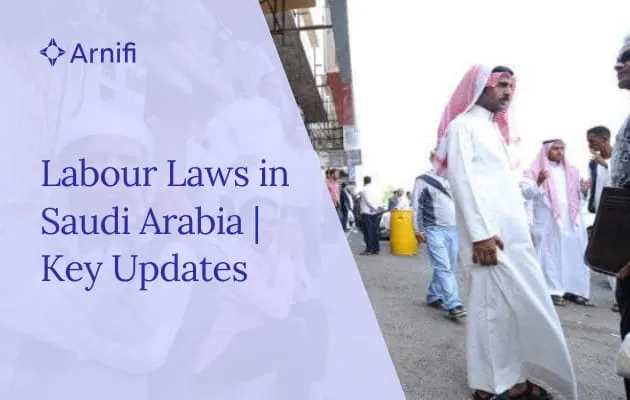Labour Laws in Saudi Arabia | Updates Every Employer & Employee Must Know
by Ishika Bhandari Sep 24, 2025  5 MIN READ
5 MIN READ

Table of contents
Saudi Arabia’s economy is drastically shifting, part of Vision 2030. Updates in the labour laws of Saudi Arabia form the core of employment contracts, leave policies, and much more. Be it a business owner or an expat employee, staying in tune is no longer an option but a necessity.
1. Introduction
Saudi Arabia is now opening up its economy for a significant historic transformation as it opens its doors to global investment and modernization of its business environment. The most significant component of this evolution is a complete overhaul of the country’s labour regulations.
It is important for multinational corporations to know about labour laws in Saudi Arabia. This becomes critical for local employers, emerging market startups, and all employees, especially expatriates, who form a significant part of the workforce.
The Labour Law updates in 2025 mirror the continuous drive of Saudi Arabia towards fairness, transparency, and competitiveness; thus, it makes compliance even more important than ever.
2. Overview of Labour Laws in Saudi Arabia
The Labour laws under Saudi Arabia are intended for private sector employers and employees, including Saudi nationals and expatriates. It aims at both and sees to it that these will have an efficient, fair working and living environment during work.
Who’s Covered:
- Saudi citizens and expats working in the private sector
- Employers hiring full-time or part-time employees
Who’s Exempt:
- Domestic workers such as housemaids and drivers
- Agricultural workers on small farms
- Seafaring crews and certain temporary workers
Regulatory Authority:
The Ministry of Human Resources and Social Development (MHRSD) will be responsible for enforcing labour law in Saudi Arabia and issuing further amendments to the said laws.
To help with global business expansion
make sure you choose us.
Get in touch with our team to find out about our approach
BOOK FREE CONSULTATIONResponse within 24 Hours
Great, please give us a brief detail about your business.
3. Key Updates
Several key changes are reflected in a more inclusive and modern workplace:
- Maternity Leave: Increased from 10 to 12 weeks, with 6 weeks to be taken after delivery
- Paternity Leave: 3 days to be availed by fathers in the first 7 days of the birth of the child
- Bereavement Leave: 3 days leave on the death of a sibling
- Probation Period: Now legally capped at 180 days for both employee and employer certainty
4. Employee Rights Under Saudi Labour Law
The amended labour laws in Saudi Arabia give a wide range of rights to employees, notably including:
- Working Hours: Maximum working hours are limited to 8 hours/day or 48 hours/week
- Overtime Pay: At the rate of 150% of the normal hourly rate
- Paid Leave:
- Annual Leave: Minimum period is 21 days, which is increased to 30 days after continuous service of 5 years
- Sick Leave: Maximum 120 days with full pay for the first 30 days
- Public Holidays: Fully paid based on Islamic and national celebrations
- End-of-Service Benefits: Gratuity, calculated considering the years of service
- Non-Discrimination: Equal Rights irrespective of gender, nationality, or disability
5. Employer Obligations
Stable labour policy obligates employers in Saudi Arabia to treat all workers fairly and provide them with legal documents. Other requirements include:
- Employment Contracts: These should be in Arabic and should include job role, salary, contract duration, and leave policy.
- Saudization (Nitaqat Program): A mandatory number of Saudi national workers that have to be recruited per company.
- Wage Protection: All salaries must be disbursed punctually via the wage payment system (WPS).
- Safe Work Environment: A work environment free from at-risk situations and providing necessary appliances and insurance.
6. Special Considerations for Expats
These expatriates working in the Kingdom must also observe the following specific provisions of the labour laws in Saudi Arabia, along with:
- Iqama Sponsorship: Every expat must be sponsored and registered under an employer for residency (Iqama).
- Job Mobility: As a result of the new reforms, job transfer is allowed without the consent of the employer after the end of the contract or after a case of labour abuse.
- Termination Rules: Normal notice between 30 and 60 days, depending on the type of contract.
7. Penalties for Non-Compliance
Failure of any of those conditions will lead to:
- Fines: Ranged between SAR 5,000 and SAR 100,000 for the different types of contraventions
- Reputational Damage: Purely public black-listing of offences by MHRSD
- Visa Restrictions: Prohibition on hiring foreign workers in cases of serious violations
Some common violations are withholding a contract, failure to pay salaries in a timely fashion, and not affording the Saudization quotas.
To help with global business expansion
make sure you choose us.
Get in touch with our team to find out about our approach
BOOK FREE CONSULTATIONResponse within 24 Hours
Great, please give us a brief detail about your business.
8. How Businesses Can Stay Compliant?
Labour compliance is no longer merely a legal obligation to be fulfilled but rather a competitive advantage.
- Updated HR Policies: Regular review of company employment policies as regards legal updates
- Consult Experts: Firms such as Arnifi are specialized in helping align international and local businesses with labour laws in Saudi Arabia
9. FAQs
Q1: Do labour laws apply to small businesses?
Yes, all private businesses comply with labour laws except for specific exemptions, such as for domestic workers.
Q2: Are expats entitled to the same leave as Saudi nationals?
Yes, otherwise expats have equal rights in the area of annual leave, sick leave, and public holidays.
Q3: Can an employer extend probation beyond 180 days?
No, the new law by 2025 provides for a maximum of 180 days of probation, including further extension.
Q4: How are labour disputes resolved?
Disputes are first addressed by the Labour Disputes Settlement Office, followed by the labour courts if unresolved.
10. Conclusion
To keep up with the labour laws of Saudi Arabia is no longer a matter of personal discretion; it is imperative for business. The 2025 updates are still reinforcing this nation’s ambition to become a world-class international hub for business, with employee welfare at the core of its endeavours.
Need assistance to help clarify the legal and HR environment surrounding business in Saudi Arabia? For expert guidance on establishing businesses, complying with regulations, and employee management in the Kingdom, contact Arnifi.
Top Saudi Arab Packages

Related Articles
Top Saudi Arab Packages



